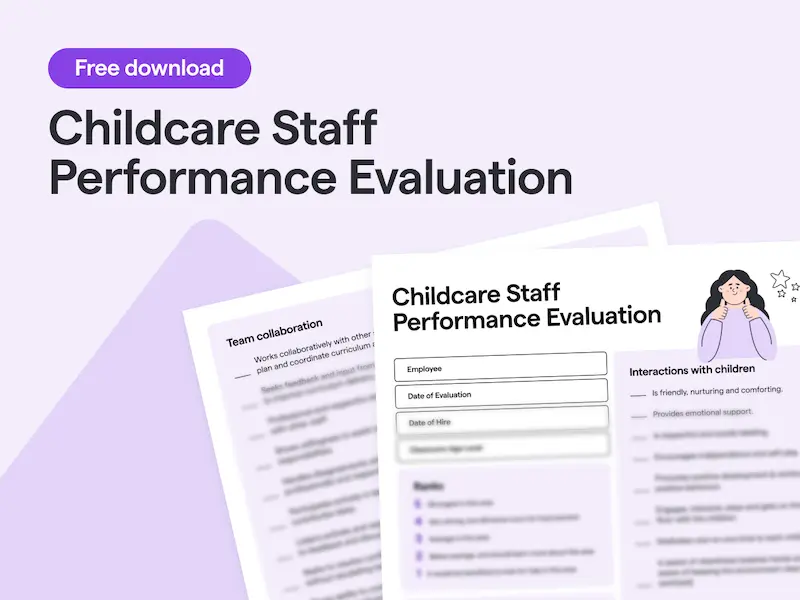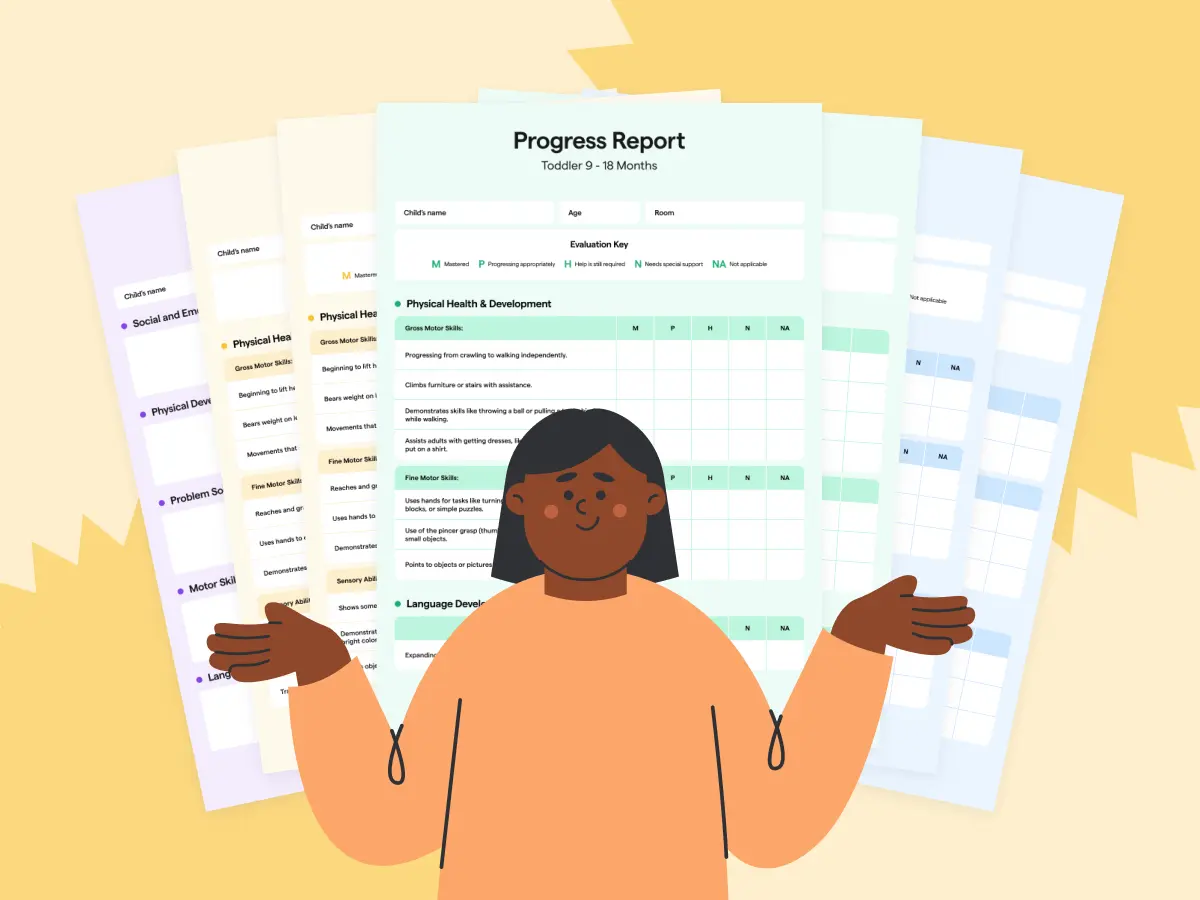settings
children
With Famly since
There is no question that children are the top priority. But, we can’t forget that ECE staff are absolutely essential to children’s safety, learning, development and growth. To make sure the children are in the best hands, staff development and support for all staff is critical. In addition to holding 1-on-1s with teachers and consistent staff meetings, a great way to ensure high quality care is through childcare staff performance evaluations.

Do preschool staff evaluations even matter?
Yes, for so many reasons!
1. Ensure quality of care
There’s no doubt that preschool teacher evaluation forms play a hugely important role in improving staff in all areas - as educators, carers, mentors and professionals.
By investing time in your childcare staff’s performance and professional development, you are also investing time and improving the quality of care you provide to the children. Performance evaluations help maintain the high standards of care that families expect.
2. Professional development & identifying training needs
Performance reviews aren't just about pointing out what's wrong. They're a fantastic tool for professional growth. It provides a platform for constructive feedback, which will help with personal professional development, and ultimately increase confidence and happiness.
These evaluations can also highlight what type of training that staff will benefit most from. With an overview of teacher performance, strengths and areas for improvement are clear. This clarity will allow staff trainings to be more relevant and specific to staff's needs – rather than providing blanket training that might not help anyone.
3. Boost moral and increase staff retention
Performance evaluations also help with staff retention. Working in ECE is fulfilling, fun and meaningful, but it is also commonly chaotic and stressful. By evaluating staff performance, it shows that their managers care about their personal professional development, want to acknowledge how valuable they are, and help them be the best carers and educators they can.
In a whirlwind of a job like ECE staff, showing this level of care creates a more positive work environment, and ultimately results in higher staff retention (and we all know that’s valuable in ECE!).
4. Accountability and transparency
Having a structured evaluation process encourages accountability and transparency. Preschool teachers and childcare staff know what is expected of them and understand how their performance is measured. This clarity helps prevent misunderstandings and ensures that everyone is on the same page, which ultimately cultivates a more positive environment and team.
The big ideas
5. Fulfill state and local requirements
Childcare centers and preschools go through their own type of performance reviews: state and local requirements and regulations. It’s simple - you have to be compliant to keep your childcare license and your doors open.
Many regulations are about the quality of care teachers provide to the children, ranging from how often staff washes their hands, to how attentive they are to each child and how relevant their activities are to the curriculum. Having teacher performance evaluations can ensure your staff are meeting those standards, so your center stays compliant.
6. Improve your center’s management
Childcare staff performance reviews provide an overview which enables managers and directors to understand their center’s best practices and also, ways to improve. By having more of a bird's eye view of staff's performance, managers and directors can step back and ask why things are being done in a certain way, and help avoid getting stuck in poor practice just because it’s the way things have always been done.
Boiled down, It’s pretty simple as to why these childcare staff performance reviews matter –- to have provide a high quality of care and run a successful childcare business!

What should staff performance evaluations include?
Now that we've covered why childcare employee performance evaluations are important, let’s dive into some of the best practices to ensure they are supportive, meaningful and effective.
Set objectives and expectations
Before beginning the evaluation process, it's crucial to have clear objectives and expectations. Having clear, measurable criteria makes the evaluation process more straightforward and fair.
If conducting performance reviews frequently, it is possible to have more specific objectives and expectations, like focusing on how well the activities align with the curriculum. But, if you only have reviews twice a year, it should be a more overall performance evaluation (like the information included in our template below!).
Have evaluation template or form ready
Having a clear process in place can make managers, directors and staff be on the same page of what is expected, and what skills or areas teachers are being evaluated on. The best way to have a clear process is to use forms or templates which include prompts and specifics to look for (like the one below!).
Consistency
Don’t wait for the official performance review to give feedback. Regular evaluations—quarterly or even monthly—can be more effective.
This way, goals can constantly be adapted so improvement is ongoing. It will also make sure there are clear expectations for the teacher's next round of reviews.
I know the day-to-day for ECE is hectic. So if you don’t have time to do frequent official performance reviews, make sure to carve out time for consistent 1-to-1 meetings with each staff member - even if it’s just for 15 minutes!
A mix of evaluation methods
A more meaningful staff evaluation is one that includes a mix of methods. This creates a more well-rounded view of a staff member’s performance.
- Self-assessments encourage staff to reflect on their own performance.
- Reviews by managers and directors are essential for seeing firsthand how teachers interact with children and manage their daily responsibilities. Directors and managers are also probably more aware of local regulations and requirements, so they can ensure teachers are meeting miniumum standards.
- Peer reviews or reviews by other staff members are valuable because they come from a colleague who has the same position. They can observe with personal experiences. They can offer strategies that have worked for them in their classroom. Plus, assessing someone else is a great step towards looking more reflectively at your own early years practice.
Provide constructive feedback
It is easy to only focus on strengths because of a fear of being ‘too mean’. But remember, constructive feedback is equally as important, so make sure to include a balance of both.
To avoid finger-pointing and blaming, use specific examples when giving constructive feedback. For instance, instead of saying “You need to improve your communication skills,” you could say, “I noticed that during circle time, you could engage the children more by asking open-ended questions.”
Using ‘I’ not ‘You’
One way to ease any potential tension during the feedback is to use ‘I’ sentences rather than ‘you’ sentences.
For example, “You shouldn’t have stepped in and answered your own question before the child had a chance to answer” should be “I would have given that child a little longer to answer the open-ended questions. I struggle with it too, but I find it helps to just count to ten before I interject”.
(This is also a great skill for staff to have for those more difficult conversations with parents and family members!)

Open, two-way conversation
When it is time to present feedback with each staff member, make sure to encourage a two-way conversation. You not only welcome their input, but you want it.
This is also a time for teachers to share their thoughts and feelings of their own performance. Allow them to expand on where they think they need more support or strategies to improve. This open communication will also cultivate a more positive working relationship and environment.
Create a plan together
Key word: together. Again, continue the two-way conversation to create a development plan. This plan should outline specific, realistic goals and actionable steps that will help achieve them.
Some strategies could be additional training, receiving a specific type of certification, mentoring, or shadowing more experienced teachers.
Having an action plan can help staff feel empowered and motivated. It also will also set a framework for the next performance evaluation because everyone is aligned on what is expected.
Celebrate improvements and strengths
Recognition goes a long way in boosting morale. Celebrate skills and areas where the staff have improved from their last performance evaluation and, of course, continue to acknowledge their strengths. Recognition not only makes staff feel appreciated and valued, but can also motivate others.
Also, too much recognition is not a thing -- Even if you have positive feedback written down, it always feels good to hear it directly and personally.
Continuous support
The evaluation process shouldn't end once the review is over. Follow up with staff regularly to check on their progress and provide ongoing support.
Recognition and celebration should not only come during performance evaluations, and neither should constructive feedback. Acknowledge positive behavior when it happens, and have a one-on-one conversation when you notice an area they may need extra support.
Make sure they know the door is always open. Goals and plans can be adjusted as needbe to better support improvement and personal development.
A few final tips on childcare staff performance reviews
I wanted to leave you with a few extra tips that will make a difference to childcare staff performance reviews:
- Keep the observations short and to the point.
- Give specific examples with constructive feedback.
- Always give feedback in a private place.
- Try an ‘observation week’ instead of a specific time slot. That way teachers don’t necessarily know when they’re observed and won’t feel like they have to ‘perform’.
- Make sure you are honest, but empathetic and considerate. No one should be made to feel like they are doing a bad job.
- Always allow teachers time to respond to feedback. Give them a day or two to process if needed. Let teachers know they have ongoing support, and can talk whenever they are ready.

Top tips from Reynolda Preschool
Get top tips from a preschool just like yours. Hear from Reynolda Preschool on why and how they use Famly - and why they’ve never looked back.
Read their story




.jpg)




